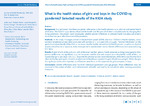What is the health status of girls and boys in the COVID-19 pandemic? Selected results of the KIDA study
Loss, Julika
Blume, Miriam
Neuperdt, Laura
Flerlage, Nadine
Weihrauch, Tim
Manz, Kristin
Thamm, Roma
Poethko-Müller, Christina
Mauz, Elvira
Rattay, Petra
Allen, Jennifer
Tschorn, Mira
Background: It is well known that there are gender differences in the health behaviour and physical and mental health of children. The COVID-19 pandemic influenced the health and lifestyles of children and adolescents by changing their living conditions. The present work investigates whether gender differences in selected health indicators are evident more than two years after the onset of the pandemic.
Methods: In the study Kindergesundheit in Deutschland aktuell (KIDA) (German Children’s Health Update), cross-sectional telephone surveys were conducted with parents of 3- to 15-year-olds (n=3,478). Parental information on the general and mental health of the child, on increased need for health care and mental health services, as well as on physical activity and utilisation of sports activities were queried in standardised manner. Gender differences were assessed using Chi2 tests.
Results: A total of 91% of the girls and 92% of the boys had their general health assessed as being (very) good by their parents (difference not significant, n.s.). An increased need for care and support was indicated for 10.6% of the 3- to 15-year-olds (girls: 9%, boys: 12%, n.s.). Boys met the physical activity recommendations of the WHO significantly more often (60%) than girls (54%). Good to excellent mental health was reported for 93% of both boys and girls. When changes during the pandemic were reported, no differences were found in the responses for girls compared to boys.
Conclusions: Gender differences were found for individual parameters and age groups. These differences must be assessed in the context of other social determinants of health, and need to be considered when planning preventive measures.
Files in this item

